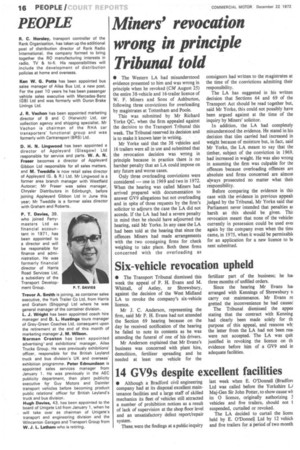Miners' revocation wrong in principle Tribunal told
Page 18

If you've noticed an error in this article please click here to report it so we can fix it.
• The Western LA had misunderstood evidence presented to him and was wrong in principle when he revoked (CM August 25) the entire 38-vehicle and 16-trailer licence of W. F. Miners and Sons of Ashburton, following three convictions for overloading by magistrates at Tottenham and Poole.
This was submitted by Mr Richard Yorke QC, when the firm appealed against the decision to the Transport Tribunal this week. The Tribunal reserved its decision and is to make it known later in writing.
Mr Yorke said that the 38 vehicles and 16 trailers were all in use and submitted that the revocation decision was wrong in principle because in practice there is no harsher penalty that an LA could impose on any future and worse cases.
Only three overloading convictions were considered — one in 1969 and two in 1972. When the hearing was called Miners had arrived prepared with documentation to answer GV9 allegations but not overloading and in spite of three requests by the firm's solicitor to adjourn the case the LA did not accede. If the LA had had a severe penalty in mind then he should have adjourned the hearing, said Mr Yorke. In any case the LA had been told at the hearing that since the offences Miners had made arrangements with the two consigning firms for check weighing to take place. Both these firms concerned with the overloading as consignors had written to the magistrates at the time of the convictions admitting their responsibility.
The LA has suggested in his written decision that Sections 64 and 69 of the Transport Act should be read together but, said Mr Yorke, this could not possibly have been argued against at the time of the inquiry by Miners' solicitor.
In addition, the LA had completely misunderstood the evidence. He stated in his decision that tiles carried had increased in weight because of moisture but, in fact, said Mr Yorke, the LA meant to say that the timber, subject of the conviction in 1969, had increased in weight. He was also wrong in assuming the firm was culpable for the offences because overloading offences are absolute and firms concerned are almost always prosecuted no matter what then' responsibility.
Before comparing the evidence in thh case with the evidence in previous appeah judged by the Tribunal, Mr Yorke said that Parliament never intended that penalties at harsh as this should be given. Thi: revocation meant that none of the vehiclet currently in possession could be used evei again by the company even when the firm came, in 1975, when it would be permissibli for an application for a new licence to in next submitted.












































































